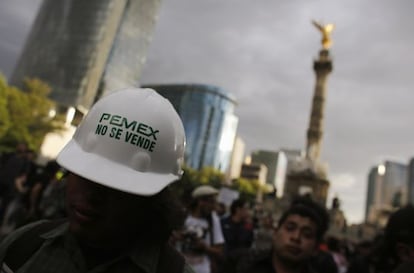Mexico’s parties draw lines in battle over reforms at state-owned oil firm
Leftists PRD warns of uproar in the streets if PRI tries to privatize Pemex

Mexico’s political forces are drawing lines in what is expected to become the mother of all battles over President Enrique Peña Nieto’s proposal to reform the state-own oil company Petroleos Mexicanos (Pemex), which will be announced in the coming weeks.
Pemex is considered by many Mexicans, especially those on the left, as an historic institution since the oil industry was nationalized by President Lázaro Cárdenas in 1938. Pena Nieto’s reforms, which could include opening some of the industry’s affiliates to foreign investors, is expected to cause an uproar in Congress – as well as in the streets of Mexico – when the plans are finally delivered lawmakers in the next several weeks.
Peña Nieto set off the first volley in the political conflict when he told the Financial Times earlier this year that his energy reform would include “the constitutional changes needed to give private investors certainty.” Other than that statement, officials from the ruling Institutional Revolutionary Party (PRI) have been vague about the reform plan. The government must outline its position for the modernization of Mexico’s oil industry, beyond its mere plans to open the sector to private investors.
The PRI does not have a majority in Congress and needs the votes of the conservative National Action Party (PAN), which, at this point, has not put up any major obstacles to Peña Nieto’s plans.
But it is a different story among Mexico’s leftist parties, who are convinced the government is set out to privatize Pemex. Leaders from the Democratic Revolutionary Party (PRD) have come out in favor of modernizing Pemex, saying that there is a need to rid the petroleum industry of labor union corruption and give it fiscal autonomy (as of now, 67 percent of its revenue is turned over to the country’s treasury).
The PRI does not have a majority in Congress and needs the votes of the conservative PAN
But they are dead set against changing Article 27, the nationalization clause, in the Mexican Constitution that guarantees state ownership of the country’s natural resources, including petroleum.
PRD leader Jesús Zambrano has warned the PRI and PAN that such a reform without a political consensus would set off “an uproar across Mexico,” including street protests and demonstrations. Not only the PRI government, but the PRD also fears this scenario because it would be a great opportunity for former presidential candidate Andrés Manuel López Obrador to make a comeback with his recently organized National Regeneration Movement (Morena).
The former PRD candidate could take advantage of protests to stoke the passions of millions of Mexicans, who are against denationalization, analysts said.
The PRD has announced that it would hold a party-organized referendum on the issue on August 25 and September in which it expects some 1.5 million Mexicans to vote in 3,400 polling stations it will set up.
“We want people to come up and cast their vote of conscience in the upcoming referendum on energy issues. We want the people to tell us what they think. There are no differences regarding national sovereignty (0f natural resources) inside the PRD,” Zambrano said.
The PRD leader was challenged in May by former Mexico City Mayor Marcelo Ebrard, who had accused Zambrano of secretly siding with the PRI over the issue. The controversy has fueled factions inside the party over the PRI’s energy initiative.
Meanwhile, the PAN has announced that it will introduce its own energy reform on Wednesday. As of now PAN leaders have swayed between favoring opening PEMEX to private investment to reforming the Constitution, but have clearly come out against complete privatization of the state-owned oil industry.
“Mexico’s energy model is an obsolete model,” said PAN national leader Gustavo Madero. “I can be called a monopoly that appears to be a para-state.”
Tu suscripción se está usando en otro dispositivo
¿Quieres añadir otro usuario a tu suscripción?
Si continúas leyendo en este dispositivo, no se podrá leer en el otro.
FlechaTu suscripción se está usando en otro dispositivo y solo puedes acceder a EL PAÍS desde un dispositivo a la vez.
Si quieres compartir tu cuenta, cambia tu suscripción a la modalidad Premium, así podrás añadir otro usuario. Cada uno accederá con su propia cuenta de email, lo que os permitirá personalizar vuestra experiencia en EL PAÍS.
¿Tienes una suscripción de empresa? Accede aquí para contratar más cuentas.
En el caso de no saber quién está usando tu cuenta, te recomendamos cambiar tu contraseña aquí.
Si decides continuar compartiendo tu cuenta, este mensaje se mostrará en tu dispositivo y en el de la otra persona que está usando tu cuenta de forma indefinida, afectando a tu experiencia de lectura. Puedes consultar aquí los términos y condiciones de la suscripción digital.








































